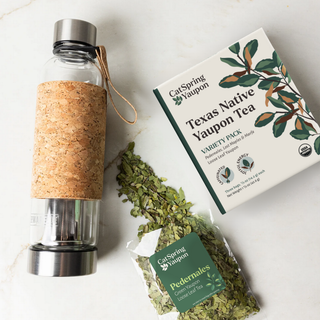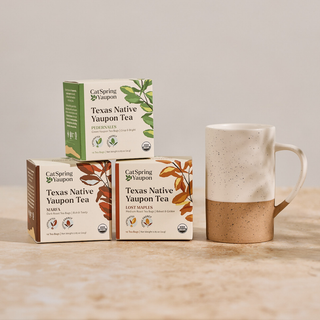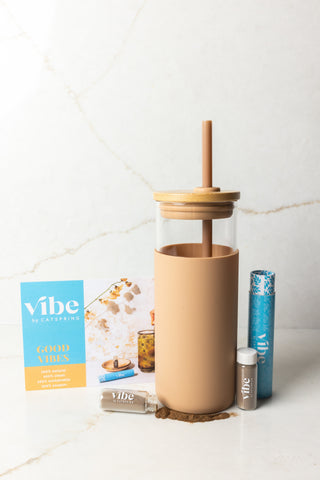Tea can support beautiful smooth skin by combatting the underlying causes of wrinkles and aging. By keeping you hydrated throughout the day, removing free radicals, and reducing inflammation, these teas offer great support and a wide range of skin health benefits for beautiful skin. In this guide, we ranked and reviewed the best teas for skin.
If you want to get some for yourself, we have a collection of the best teas for your skin right here in tea bags, loose leaf, or iced tea pouches.
What is the Best Tea for Skin?
1. Yaupon Tea
Yaupon is the only naturally caffeinated plant native to North America. It has unique properties that traditional teas lack. One of these benefits is rutin, which is also found in apples and lemons. It’s an anti-inflammatory and Yaupon even has 4 times the amount of rutin as found in its popular cousin plant, guayusa. This compound can also boost collagen production.
Benefits:
- Enhance collagen production to promote smooth and healthy skin.
- Decreased chronic inflammation via chlorogenic acid (CGA) that has anti-inflammatory properties and antioxidant properties to soothe irritated skin.
- A boost for your immune system from antioxidant activity that remove free radicals in your body to prevent free radical damage to cells and organs.
Side Effects:
- May cause sleeplessness due to caffeine if large amounts of yaupon are consumed all at once.
Try our CatSpring Yaupon tea to support healthy skin. It’s organic, non-gmo, kosher, sustainably grown, and naturally caffeinated.
2. Jasmine Tea
Jasmine tea is scented with blooms from the jasmine plant in a base tea. This base tea is normally a green tea, though white or black teas can also be used. The jasmine blossoms can be stored in or near tea to allow the aroma and flavor to infuse in. Jasmine tea will often have the same or similar benefits as its base tea. For this, we’ll focus on green jasmine tea.
Benefits:
- Combat free radicals with the help of polyphenols and other antioxidants that protect your organs and cells.
- Promote healthy cholesterol levels and blood flow thanks to the polyphenols and can support healthy skin cells.
- Improve metabolism as studies show that green tea can increase metabolism 4-5% and fat burning 10-16%.
Side Effects:
- May cause sleeplessness if too much caffeine is consumed.
3. Green Tea
Green tea is made from the traditional tea plant Camellia sinensis and has not undergone oxidation like black teas. It has a multitude of health benefits and, similar to Yaupon, it has natural caffeine in it. Each cup is full of antioxidants which can provide sinus relief and soothe inflammation. Some studies have even shown that it can lower blood pressure.
Benefits:
- Protect your skin with the polyphenols and catechins from green tea that reduce free radicals that damage your cells.
- Stay hydrated by enjoying multiple delicious cups throughout the day to maintain plump skin and reduce dry skin.
- Ease inflammation by inhaling the aroma.
Side Effects:
- May cause sleeplessness due to caffeine if large amounts are consumed all at once.

4. Rooibos Tea
Originating in Africa and now popular worldwide, it’s a caffeine-free alternative to traditional black tea and even similarly often undergoes oxidation though unlike black tea it is also often fermented. It has an earthy flavor that can be similar to yerba mate. Your brew is less likely to be bitter too because rooibos has less tannins than other teas. Just like Yaupon tea, Rooibos has a compound called Rutin in it that helps block the release of histamines which play a role in the cause of headaches.
Benefits:
- Support your skin with high levels of antioxidants that remove free radicals and protect your healthy cells and organs.
- Contains high amounts of vitamin C which helps boost your immune system.
- Combat wrinkles with alpha hydroxy acid (AHA) that aids with anti-aging wrinkle reduction.
Side Effects:
- Consuming too much rooibos has been linked to damage your liver so be sure to talk to your doctor

5. Chamomile Tea
Chamomile is primarily brewed from one of two daisy-like species of flower and commonly known for its stress-relieving properties. It’s long been believed to have health benefits though many are still under research. One benefit is supporting a healthy heart through the compound flavones which has the potential to lower blood pressure and cholesterol levels.
Benefits:
- Promotes sleep due to its chemical structure, helping you get that beauty sleep you deserve and that promotes healthy skin.
- Its anti-inflammatory properties have been shown to boost your immune system and protect your skin which is your largest organ.
- Ease stress which can reduce tension and fatigue that wear out your skin.
Side Effects:
- Chamomile does make you drowsy so be aware before consuming.
6. White Tea
White tea gets its name from its preparation. For white tea, the tea leaves are picked just before they are fully opened and they have small white hairs all over them, lending this particular brew its name. It is also the least processed of the different types of tea. This means it has a high concentration of many benefits of tea including antioxidants such as catechins. It has a pure, understated flavor profile.
Benefits:
- Keep skin tight and firm thanks to polyphenols that protect from compounds that weaken the skin’s fiber network.
- Support healthy skin by preventing enzymes that break down collagen.
- Smooth your skin with antioxidants and catechins that remove free radicals that may damage healthy skin.
Side Effects:
- May cause sleeplessness due to caffeine if large amounts are consumed all at once.
The Bottom Line
Owing to their amazing healthy-boosting properties, these are some of the best teas for skin. They can help smooth skin, reduce oily skin, combat signs of aging, support healthy collagen levels, and prevent further damage.
If you want to get our best tasting tea for skin, check out our organic, naturally caffeinated CatSpring Yaupon tea here.
Medical Disclaimer: This article is for informative purposes only and shouldn’t be taken as medical advice. If you have serious health-related issues you should reach out to a medical professional. While we have studied the scientific research available, this is not intended to diagnose, treat, cure, or prevent any disease.













